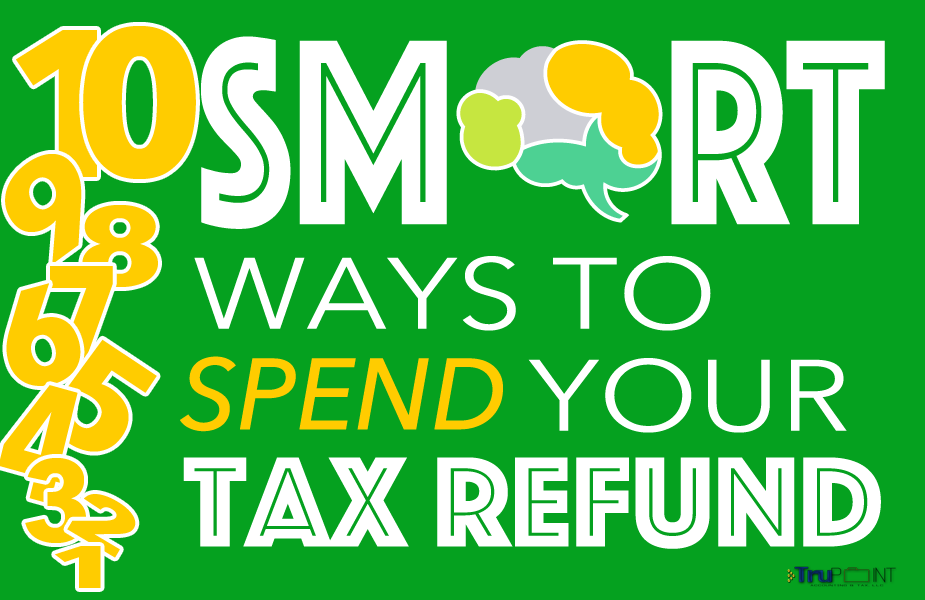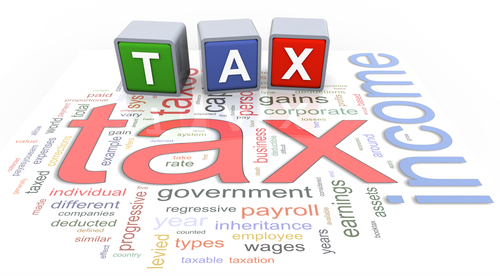10 Smart Ways To Spend Your Tax Refund
Did you already spend half of your tax refund in your head? What if we told you that there are far more intelligent ways and things to spend your refund on other than your usual shopping sprees and nights out? The average refund amount within the last 2 years have been around $3,000, that’s a pretty hefty chunk of change that can either make or break your year. We’ve compiled a list of the most intelligent things your tax refund can do.
1. Start a small business.
Purchasing business development services for your small business idea is a great way to put your refund to use. A proper business plan will normally run you about $500-$10K from major accounting firms. Meanwhile, Licensing and pertinent registrations can cost anywhere between $5K-$15K at a major accounting firm. TruPoint Accounting & Tax decreases that cost up to 75%. Think smarter. Keep more of your money and decrease cost.
2. Increase your savings.
This is the best time to pump a large amount of cash into your savings. Whether you’re saving up for a rainy day or a new house, we say “Act like you’ve never received a refund and save, save, save”!
3. Finish a remodeling project.
Spruce up your place by finalizing on a costly home project and have the whole year to bask in the ongoing savings. Your home improvement can qualify as a deduction if it adds materially to the value of your home; or prolong your home’s useful life significantly; or adapts your home to new uses. Chat with someone or call TruPoint Accounting & Tax today at 407.203.3031. We’ll help you find even more deductions that are allowed.
4. Buy Insurance.
This is the perfect time to get yourself, home and other liabilities covered. Monthly and yearly plans for home insurance can range around $700-$1500 per year. Life and car insurance typically starts from $50 to $300 per month.
5. Make Investments
Invest in mutual funds or stocks you’ve been considering. It may be a risk worth taking.
6. Pay off Bill Collectors
Take some creditors off your back by paying off a substantial amount of credit card debt and past due bills. This may even be the time to close any credit card account with too high of an interest rate.
7. Travel.
Put your refund on a separate account and prepay for a nice vacation rather than raking up credit card bills and dipping into your emergency fund.
8. Pursue Education.
Put money towards your education. Take a few college courses and improve your education without loans and government assistance.
9. Give back.
Help give back by donating to a local charity, school, or just someone who needs the help. It doesn’t always have to be cash. Charity in the form of food, clothing and shelter is always appreciated.
10. Splurge Intelligently! Go Green
Make a large purchase on a solar panel system for your home and save thousands of dollars in electrical bills.
Should churches issue ministers a Form W-2 or Form 1099-Misc?
Should churches issue ministers a Form W-2 or Form 1099-Misc?
Most ministers have a “dual tax status”. Generally, they are employees for income tax purposes but are always self-employed for social security purposes with respect to their ministerial income. Ministers working for a church or church agency should receive a Form W-2. Ministers, who report their federal income taxes as self-employed on Form 1099, may face a significant risk of additional taxes and penalties, if they are audited and reclassified as employees by the IRS.
Under the latest treasury regulations, a minister is described as an employee for federal income tax purposes but as self-employed for social security tax purposes. What many minister’s often fail to consider is that when one files a 1040 tax return they are paying two types of taxes. They pay Federal Income Tax and Self Employment Tax. That makes the minister a hybrid of the tax code. Section 6051 requires the issuance of a W-2. However, because Section 3401 describes him/her as self-employed, the church is not required to withhold Federal Income Tax, FICA or Medicare taxes from their ministers’ pay, even if their ministers are employees for income tax purposes.
Many ministers voluntarily elect to have churches withhold income taxes from their pay. Most churches are required to withhold income taxes from non-minister employees. Churches can give ministers a Social Security “allowance” or “offset” to help the minister pay SECA taxes. Social Security allowances or offsets are considered as extra income. Ministers will have to report the allowance as income for federal income tax purposes and as income for SECA tax purposes.
Determining a taxpayer’s correct reporting status under the common law employee test is often difficult. The IRS has developed a list of 20 factors to be used as an aid in determining whether an individual is an employee as defined by the IRS. For more information about how the IRS decides if a worker is an independent contractor of employee, see IRS Publication 15-a, Employer’s Supplemental Tax Guide (Supplement to publication 15 (Circular E), Employer’s Tax Guide, on the IRS website at www.irs.gov.
For the most part, ministers are deemed to be common-law employees of the religious organization for which they work, and thus they should receive a W-2 form.
There are only a limited number of instances where a 1099-MISC may be applicable, one of which is if a minister is a traveling evangelist. As this is an easy IRS audit target, a tax preparer must exercise due diligence in ascertaining that a 1099-MISC issued to a minister is appropriate.
The IRS uses a checklist to evaluate whether individuals are independent contractors or employees. If your church controls the “who, where, when and how” of your work schedule, you’re probably an employee for tax purposes.
If you control your work product and have other clients, you’re most likely an independent contractor and should get a 1099 tax form.
There is a reason why the IRS demands a W-2. It is because under a W-2, the minister is not allowed to deduct business expenses on the Federal Income Tax portion of his/her liability except under the limiting reporting of Form 2106. If the minister gets a 1099-Misc, he/she usually deducts 100% of his/her expenses under Schedule C and gets a lower Federal Income Tax bill. Though many ministers do it this way, their chances of getting audited are higher and usually result in payment of back taxes plus penalties.
Most Extreme Tax Deductions of 2015
When it comes to tax season, taxpayers will always try to find ways to get the most money from their refund. Like the time you tried to claim your dog Toby as a dependent. After all, he does “depend” on you as his pet owner, and those dog treats don’t buy themselves. But for some, getting the most may require doing the most extreme deduction possible. Here’s a list of the ten most outrageous deductions of 2015, so far.
1. Ghost Dependents
As it is common for most tax payers to try to claim their pets as dependents, it’s certainly extreme to try and claim an unborn child. The Texas mother who attempted this was not “expecting” the call she received from IRS.
2. A Joyous Occasion
So you got married this year, congratulations! Unfortunately, party-ing it up on the night of your wedding with 250 “business partners” is not actually deductible as entertainment expense.
3. Horseplay & Hobbies
Sorry, but IRS does not deduct hobby expenses. One client learned that fast when he tried to take deductions his horse ranch.
4. Keepin It Up!
Your job may require you to keep up with your appearance when meeting with clients, but a new haircut, surgical procedures, and your stylist expenses are generally not deductible. But you look good though.
5. Having A Home Office
IRS allows deductions only on the portion of the home that is dedicated to the business. Some at home business owners have gone to the extreme trying to claim groceries and even the mortgage.
6. Getaway Trips
Taking your vacation days shouldn’t be a problem. Taking deductions on the vacation you and your co-workers took in Jamaica is a big one for the IRS.
7. Traffic Fines
Running a traffic light on the way to your business meeting can happen, but speeding tickets are fines and therefore, not deductible on your tax return.
8. Misleading Charitable Donations
Indeed, charity can come in many forms. But for one CPA’s client, he learned that vehicles impounded by the police are not deemed as qualifying deductions.
9. Boats
Avoid rough seas with the IRS by not deducting your boat as a “water computer” as one CPA had to enlighten their client.
10. Bad Investments
A loss on a sale of home is unfortunate, and also doesn’t qualify as investment by the IRS therefore, it is not a qualifying deduction.
Have questions on what’s deductible and what’s not? Don’t fall in the same extreme category as these folks. Contact us for more advice.


